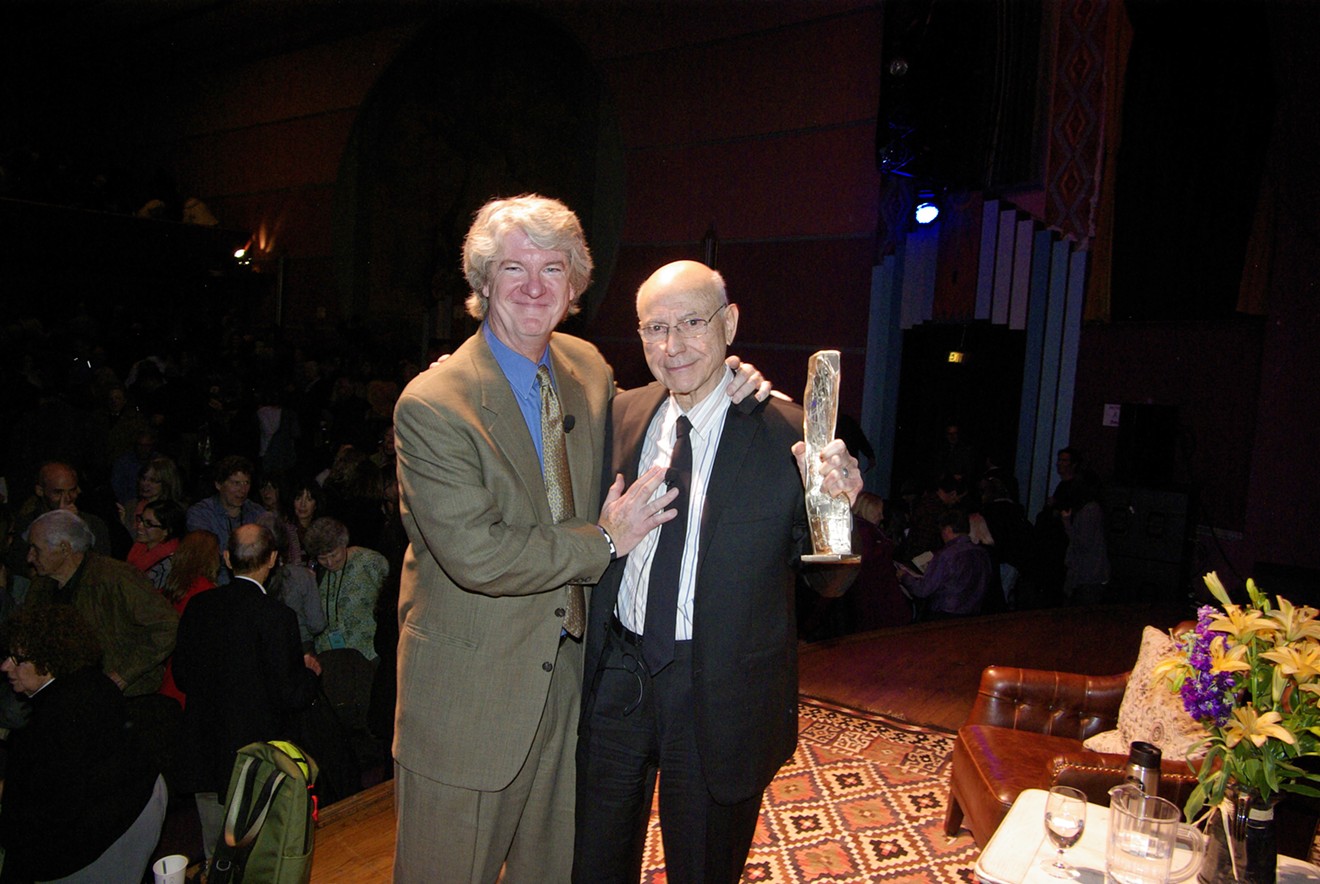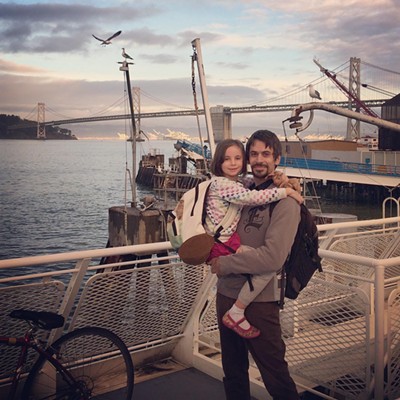For many folks who attend the Boulder International Film Festival, the highlight is the annual gala, where an A-list celebrity is honored at the Boulder Theater. Ron Bostwick, the colorful and ebullient Colorado Sound DJ, not only conducts a live interview with the honorees, but also picks them up at the airport and develops a rapport before the big night.
From James Franco and Alec Baldwin to David Crosby and Oliver Stone, Bostwick has welcomed and interviewed an impressive — and at times intimidating — list of BIFF honorees over more than a decade.
This year, rock-and-roll legend Robbie Robertson will be Bostwick’s guest, as BIFF celebrates the release of Once Were Brothers: Robbie Robertson and The Band, a documentary about Robertson and the Band that features Scorsese and Ron Howard as executive producers. After a screening of the star-studded documentary on Friday, March 6, Bostwick will sit down with Robertson for an hour-long chat on the Boulder Theater stage.
We caught up with Bostwick to talk about his experience interviewing the stars of BIFF.
Westword: You were obsessed with music from a very young age and have been a DJ since college. When did your passion for music overlap with movies?
Ron Bostwick: It wasn’t until my late twenties that I worked at a film and video company in Boston, making TV commercials. I worked with a guy who was really into film and taught me a lot about film and how it’s made and what it’s for. He increased my appreciation of classic movies and film. That was the time period when I started my Oscars pool that I’ve now been doing for 29 years. I found myself falling into being really interested in it and the creation of it. I was already a music fan, and I found it really easy to be a film fan at the same time.
How did you become affiliated with the Boulder International Film Festival?
How BIFF happened was, I leave Boston, I move to Colorado in the early ’90s, I land in Steamboat Springs, where I lived for five years and worked in radio, and then got a job in Boulder and moved here in ’98 and worked for eTown, the radio show that’s based here. I worked as the music booker at eTown and then went to KBCO as their morning-show producer and then the promotions director.
During my time with Bret [Saunders, KBCO morning-show host], I got to know the two sisters who run the film festival — the Beecks — right when they were starting BIFF. They came to me one day and asked if KBCO would want to be the radio sponsor for the festival. They barely finished the sentence, and I said, “Yes.” I could see that BIFF was going to become what it would become. A year later, when I left that job, they reached out to me and asked if I would produce a tribute to John Belushi that I would present at BIFF…but it didn’t work. But I became involved with BIFF, and a year later became the executive producer and started running it with Kathy and Robin [Beeck].
Back in, I think, ’07, a screenwriter and director named Susannah Grant, who had made a film called Catch and Release, was gonna come [to the BIFF]; they tried to find someone to do the post-film interview with her and couldn’t get anyone, and then sheepishly turned to me and said, “Would you want to do the interview? We can’t get anyone else.” I said, “I’d love to,” and then once I did that interview, Kathy and Robin said, “Oh, my God, you can interview, too!” and that’s when I became the guy who does all the interviews.
The Chevy Chase one [in 2010] was the first major celebrity, right?
Chevy was the first big name, the first Hollywood name. Previous to Chevy, Eric Roberts had come. That guy who played “Puddy” on Seinfeld [Patrick Warburton] had come, also, as had Maria Bello [Coyote Ugly, Grown Ups].
There’s a big difference between Chevy Chase and “That guy who played ‘Puddy.’”
I agree with you. Chevy was the first big “Holy crap; this is somebody that everybody knows.” We all know who Chevy Chase is. That was the first step of “Oh, BIFF is really becoming something.” It just shows kinda where BIFF has come to from its early days that people like Lawrence Kasdan will come.
How involved are you with who will be the big-name interview every year?
Because of my work with the Colorado Sound, which is the new radio sponsor of the festival, I’m rather detached and not in the office every day like I used to be. If Kathy and Robin need a little fine-tuning…I was that way with Robbie Robertson. They got in touch with me really early. Being the music guy, they were not as familiar with Robbie. I was, and I said, “Robbie is a god. If you can get him, fantastic.” I helped write the invite letter, to make sure that he understood where we were coming from, music-wise.
As much as you love both music and movies, when you have someone from the music world as the big honoree, is that a home for you? Like, “This is my world”?
Oh, of course. When we had Jakob Dylan [at BIFF], I thought of how I’d introduced the Wallflowers in 1995 at a club in Steamboat. It was very small. And especially with somebody like David Crosby, who I’d worked with and been around — I’m very comfortable with somebody like Crosby. And the way that I ended that [BIFF interview] was, I put up on the screen my ticket stub of seeing Crosby, Stills, Nash and Young in 1974. That makes it more of a personal connection. When it's a music person, I’m really, really comfortable, just because I come from that world and I can speak without any research.
Is there anybody who was especially difficult?
Yeah [laughs]. I will say that if I meet people and they’ve gone to BIFF a number of times, there’s always one person that they say, “What was wrong with this person?” because they were there that night and it just didn’t go well. I don’t need to say who it is. The people who were there will know exactly who I’m talking about. They just weren’t present; they were there in body, but they were not there on the stage with me in spirit, and it really showed. And it really shows with someone like Alan Arkin, who was dealing with a cold and wasn’t his best, but was so happy with his experience here and so touched by what we did for him that about eight months later he got invited to a comedy festival in San Francisco and said, “I’ll do it, but I want to bring my own interviewer,” and Alan flew me out to San Francisco. He and I have stayed friends. He was so touched by the way he was treated here.
Are you more starstruck by the music people?
You know, if I get starstruck, it’s when I’m first told that they’re coming. I do it, and I get it out of the way, because the last thing that they want is for me to be like the Chris Farley character [from Saturday Night Live]. “Remember when you were in the Beatles? That was awesome!” I never want to be that guy, and if I am that guy, then I’m that guy when we’re done and we’re off stage, and I just say something nice and let them know that it’s something important to me.
How do you know what not to ask?
The past is what sells tickets. With somebody like Robbie, there will be a lot of Band fans in the audience. With Chevy Chase, there were a lot of SNL fans in the audience. If I’m going to ask about what might be construed as an uncomfortable past, I’m going to try to put it in the perspective of, “You’re older now — what have you learned, and what can you pass on to the audience?” You try to find that right angle and then ask yourself if it’s appropriate. But also, there are two captains on the ship, and you gotta read that person while you’re with them, and where they wanna go, or where they will go, even if they don’t want to. You ask [yourself] what’s the right and best thing to do. You find your best way.
Somebody’s gotta scream, “Judas!”
Well, that’s one of the video clips I’m gonna show, because [Robertson] was standing right there for, I think, one of the seminal moments in rock-and-roll history. I’m quite thrilled, in the same way that I got to sit on stage with Crosby. The Before the Flood album with Dylan has become my favorite live album of all time, so for me to be able to sit with Robbie and talk to him about his life, about his music and about film is a dream come true. I can’t believe that I get to live in Boulder and do this.
The Boulder International Film Festival runs Thursday, March 5, through Sunday, March 8, at various venues in Boulder and Longmont. For more information and tickets, go to the BIFF website.
[
{
"name": "Air - MediumRectangle - Inline Content - Mobile Display Size",
"component": "12017618",
"insertPoint": "2",
"requiredCountToDisplay": "2"
},{
"name": "Editor Picks",
"component": "17242653",
"insertPoint": "4",
"requiredCountToDisplay": "1"
},{
"name": "Inline Links",
"component": "18838239",
"insertPoint": "8th",
"startingPoint": 8,
"requiredCountToDisplay": "7",
"maxInsertions": 25
},{
"name": "Air - MediumRectangle - Combo - Inline Content",
"component": "17261320",
"insertPoint": "8th",
"startingPoint": 8,
"requiredCountToDisplay": "7",
"maxInsertions": 25
},{
"name": "Inline Links",
"component": "18838239",
"insertPoint": "8th",
"startingPoint": 12,
"requiredCountToDisplay": "11",
"maxInsertions": 25
},{
"name": "Air - Leaderboard Tower - Combo - Inline Content",
"component": "17261321",
"insertPoint": "8th",
"startingPoint": 12,
"requiredCountToDisplay": "11",
"maxInsertions": 25
}
]












